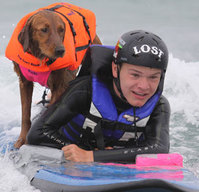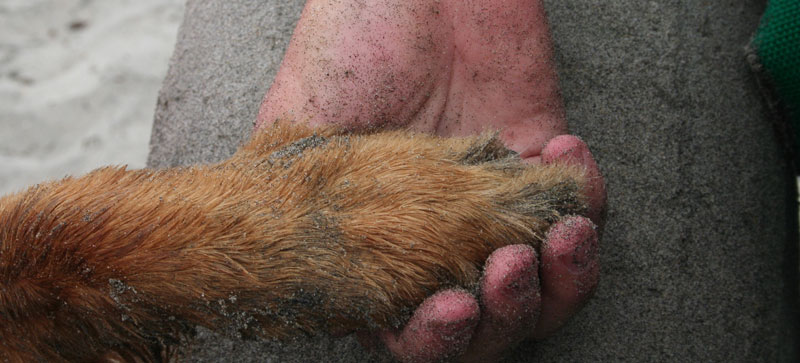SHARING THE STOKE WITH YOUR DOG

Ricochet has been sharing the stoke since 2009, when she made an independent decision to jump on a surfboard with a boy who is quadriplegic. This year, she is celebrating 10 yrs as the first-ever dog to surf with kids with special needs, people with disabilities, wounded warriors & veterans with PTSD as a form of surf therapy, assistance, healing & empowerment.
Since that day in 2009, she has taught, and surfed with hundreds of individuals from the severely disabled, to the able-bodied to everything in between. Although she wasn't placed as a service dog, she was highly trained as one. She is also a registered therapy dog with Alliance of Therapy Dogs, a certified goal-directed therapy dog with Paws'itive Teams and holds the highest therapy dog title with the AKC. Her guardian, Judy Fridono has a degree in assistance dog training which gives them both many years of experience and expertise in the areas of disabilities and dogs.
As such, we have been asked many times how other dogs could do what Ricochet does. But, as we know, all dogs are individuals, living their own specific life purpose. So there is no other dog that can do exactly what Ricochet does. And vice-versa. However, we have provided 10 tips to start you on the path to sharing the stoke with your dog, and if you haven't already... finding their life purpose. So, be sure to check out our "unleash your dog's healing power" page too.
If you have further questions, please contact us at [email protected]/
10 tips for sharing the stoke with your dog
- Listen to your dog. Are there certain types of people your dog gravitates towards? Kids, adults, seniors? Pay close attention to the slightest cues, body language and actions of your dog to find out.
- Once you’ve determined the population your dog enjoys, look for organizations that serve that segment.
- Ensure you know as much as possible about the illnesses or disabilities of the chosen populations. Know how to respond to outbursts, fears, over-stimulation, limitations, adaptations, etc.
- Become a certified or registered therapy dog team to make it official.
- Ensure you have liability insurance that covers you, your dog, the population you want to serve, and the environment you’re working in. Even a scratch can become a liability.
- Become familiar with laws as they relate to descriptions, certifications, registrations and public access of therapy dogs, emotional support dogs, service dogs and pet dogs. Only service dogs are allowed on non-dog friendly beaches, so you will need to get permission for your dog to be on the beach. Start with the lifeguards, but you may need to talk with city officials. The same thing goes for restaurants, stores, airplanes, etc. See below for definitions of each type dog.
- Make sure your dog is comfortable putting their focus on someone other than you. They should actively solicit and engage with others, and not look to you for direction.
- Teach your dog some tricks, and practice with other people than yourself giving the cue. This way, when you’re with your population, they can give the dog a cue and the individual will feel a great sense of accomplishment when your dog does it.
- Safety is the number one priority, so be sure to develop safety protocols.
- Have fun!
The different types of dogs
- Pet dogs – only allowed in pet friendly places.
- Therapy dogs – are pets that are only allowed in pet friendly places. The owner and dog are a certified or registered team with a reputable organization. Online registrations or certifications are meaningless and a scam to make money, so try not to fall into that trap. Therapy dogs provide comfort and interaction to many individuals.
- Emotional support dogs – are pets that are only allowed in pet friendly places, except the cabin of airplanes and no-pet housing with a note from a mental health professional. Remember, emotional support dogs provide comfort to their owners, not the general public. So, if you don’t have a psychiatric diagnosis yourself, your dog wouldn’t be considered an emotional support dog, and therefore wouldn’t be allowed in the cabin of a plane or no-pet housing.
- Service dogs are NOT considered pets, and they DO have public access, such as stores, restaurants, planes, housing, etc. These dogs do NOT need to be certified or registered, so beware of the online pages that offer to SELL you a certification, vest, etc. The only thing that is required of a service dog is that they are trained in at least two tasks that mitigate a person’s disability. And the service dog is only a service dog when accompanied by the disabled individual.
If you go to the main navigation at the top of the page and click on "assistance dogs", there is much more information on each type dog.

